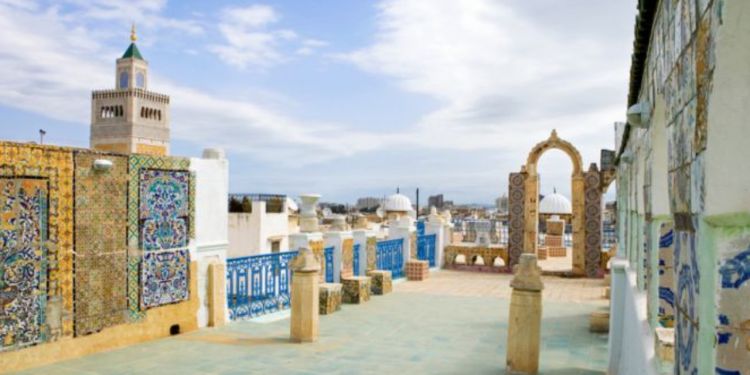Working in Tunis

Tunis is the capital city of Tunisia. As the national economic and commercial capital city, it has been attracting many expatriates over the years. Some come here to retire, some choose Tunis as the base from where they can work freelance. Some, on the other hand, come here in search of work opportunities.
If you are interested in working in Tunis, the first step towards this would be to learn more about the city's economy, labor market and most promising fields where you can start your job hunt.
Why Tunis?
Tunis is the capital of Tunisia and the biggest city in the country. It's a relatively compact city with a population of under 700,000 people.
The city is a popular tourist destination, known for its historical sights, urban attractions and resort areas outside Monastir.
If you want to work in Tunis, you will find the most opportunities in fields like manufacturing, hospitality, tourism and real estate.
While the work options in the city may be limited, there are also lots of benefits that come with living and working in Tunis.
Even though Tunis is a capital city, the cost of living here is much lower compared to European capitals. If you are working for an international company in Tunisia and receive “an expat salary”, you will be able to enjoy a comfortable lifestyle.
Tunis may not be known for its beaches, but it is a coastal town with lots of wellness options to explore. It is also home to a large number of historical sights and other attractions that will make your life here full of new discoveries.
The economy in Tunis
In September 2014, Tunisian authorities launched a huge project named Tunisia Economic City. This project implied the construction of the first complete global and modern economic, tourist, social and cultural city between Enfidha International Airport (in the Sousse Governorate) and Bouficha in the South of Hammamet (in the Nabeul Governorate). The aim of this economic city was to create around 250,000 jobs during its first 6 years of existence in the following fields: hospitality, leisure, medical and health care, and media, among others.
Currently, most of the city's income comes from textiles, carpets and olive oil, durum wheat, wine, vegetables and pulses, as well as tourism.
Given its strategic position, Tunis also hosts one-third of companies, including the head offices of many Tunisian companies with more than 50 employees (except the Compagnie des Phosphates de Gafsa which is located in Gafsa).
The labor market in Tunis
Every year, some 80,000 students graduate from Tunisian universities. Therefore, the local labor market already has qualified human resources at its disposal. In fact, many Tunisian students also complete their higher studies abroad, especially in Europe. Thus, the local labor market tends to hire more Tunisian nationals.
Foreign nationals, for their part, can try their luck with international companies operating across the city. Depending on your qualifications and skills, you are quite likely to find a job in the following fields: information and communication technology, aeronautics, banks, energy, agri-food, mines, textile, retail, as well as tourism.
Experienced professionals can also find opportunities in the petrochemical and construction industries.
The Tunisian government has also announced a goal to create over 10,000 jobs per year in the IT sector. With the cost of labor significantly lower in Tunisia compared to Europe, some international companies set up bases here in search of local talent. Tunisia is home to multinationals like Ericsson, Microsoft, Alcatel, and others.
How to find a job in Tunis?
There are a number of ways you can look for a job in Tunis.
One of the simplest ways to go about it is to look for a job online. This is an option if you are looking for a position at one of the multinational companies in Tunis, as they would frequently post their job offer online. Make sure you keep your LinkedIn provide updated as well, and consider changing your current location to Tunis to be more visible to employers in the city.
Smaller local Tunisian companies, on the other hand, often rely on the world of mouth and networking for recruitment.
Feel free to spread the word among your friends, family and other contacts on the spot so that they can put you in touch with employers. Consider giving them a copy of your resume as well.
You can also make a list of local companies which might require a candidate with your profile and either contact them by phone or send them spontaneous job applications by email.
Another way to work in Tunis is to get relocated to the city within your own company. This way, you will be able to benefit from a package of relocation benefits. Depending on the company you work for, these may include return tickets, accommodation, health insurance, living expenses, and more. You will also be earning a higher salary compared to when hired by a local company.
How to apply for a job in Tunis?
If you are applying for an expatriate position or a position at one of the many multinationals in Tunis, you can submit your resume and cover letter in English.
However, if you are sending your application to a smaller local company, you should have your resume and cover letter in French or Arabic.
You can use standard resume formats when applying for work in Tunisia: you can focus on your work experience and list it in reverse chronological order, or you can highlight your professional skills if you don't yet have much working experience.
When composing your cover letter or resume, it's best to avoid mentioning affiliation with any religious organizations and groups.
What are the working conditions in Tunisia?
The Labor Code, as amended by Law 96-62 of 15 July 1996, fixed laws regarding working conditions in Tunisia. The Labor Code regulates the following:
- the legal working age
- the legal working week
- entitlement to leaves
- and employment contracts for both Tunisian and foreign workers.
What is the minimum working age in Tunisia?
In Tunisia, children are allowed to work from the age of 16. However, the ability of children to work must be determined by medical supervision until the age of 18. In fact, a child can only remain in continuous employment provided he undergoes a medical examination every semester.
Working week in Tunisia
The legal working week consists of a maximum of 48 hours and is rarely under 40 hours a week.
Employees are entitled to a one-hour rest during their working day. This break can be taken once or several times.
As for part-time jobs, the legal working week should generally not exceed 70% of the normal working week. Note that the accumulation of full-time and part-time work is prohibited.
There are also several public holidays observed in Tunisia:
- New Year's Day on January 1st
- Independence Day on May 20th
- Martyrs' Day on April 9th
- Labour Day on May 1st
- Aïd El-Fitr (dates vary)
- Aïd El Kebir (dates vary)
- Republic Day (July 25th)
- Ras el am el Hejri (Islamic New Year)
- Women's Day (August 13th)
- Prophet Mohammed's Birthday (October 9th)
- Evacuation Day (October 15th)
- Revolution and Youth Day (December 17th)
The number of days off you get for the holidays above depends on the company you work for and the industry you are in.
Weekly rest days in Tunisia
Agricultural and non-agricultural workers and their dependencies are entitled to a weekly rest day of twenty-four consecutive hours. This rest day may be granted either on Friday, Saturday, or Sunday. In the agricultural sector, the rest day may also be granted on the weekly market day.
Annual leaves in Tunisia
All employees are entitled to a paid day off per month annually, provided they have been working with the same employer for at least one month.
However, the duration of the requested leave can not exceed a period of fifteen days with twelve working days. After five years of service with the same employer, the employee is entitled to an additional leave per period.
Leave dates are fixed on the 1st January of each year. In general, these are granted every year from June 1st to October 31.
The minimum salary in Tunisia
As of 2022, the minimum wage in Tunisia is set at 340 Tunisian dinars ($220) per month for a 48-hour work week. For a 40-hour work week, it is set at 290 dinars ($199) per month in the industrial sectors. Agricultural workers make from 9 dinars ($6.50) to 14 dinars ($10) per day.
Your salary in Tunis will depend on a number of factors. These include your line of work, the company you work for, your position in the company, and more.
As we've mentioned earlier, being relocated to Tunisia by your own company may be the best option in terms of money and benefits. If you relocate to Tunis with your company, you may often receive a generous compensation package and relocation benefits.
How much you earn in Tunis depends on what line of work you are in and the company that employs you. Note, however, that even within the same industry, the salaries in Tunisia can vary greatly.
Here are a few examples of salaries in Tunisia:
High-level software development professionals in large companies report salaries from 5,000 dinars ($1,600) to 12,000 dinars ($3,800).
Salaries outside the IT fields are typically lower. For instance, a secondary education teacher makes around 1,000 dinars ($320) to 1,500 dinars ($490).
As we've mentioned above, you will also have a good chance of finding work in the tourism and hospitality sector. The salaries here vary a lot depending on the company you work for.
How to obtain a work visa in Tunisia?
If you want to work in Tunisia, you will need to obtain a work permit. You will need to have your work permit sorted out before you start work — and the process for getting a work permit may take from four to six weeks.
In order to receive a work permit in Tunisia, you will need to be sponsored by your employer. Note that receiving a job offer doesn't mean that your employer is ready to sponsor your work visa. This is why you need to discuss work visa sponsorship with your potential employee right away and make sure they are equipped to provide a work visa for you.
Useful links:









